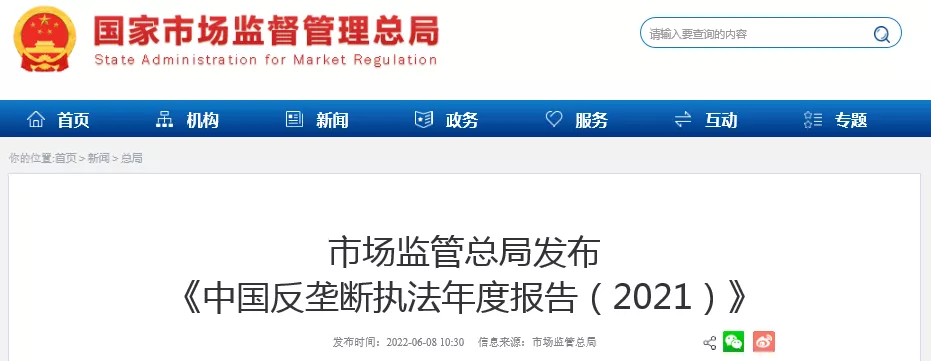Recently, the State Administration of Market Supervision issued the annual report on China's anti monopoly law enforcement (2021) (hereinafter referred to as the report), which consists of nine chapters. Among them, the third chapter is about industry law enforcement, involving the semiconductor industry. The report points out that in 2021, the State Administration of market supervision received 27 cases of concentration of business operators in the semiconductor industry, 24 cases were filed and 26 cases were concluded, with a total transaction amount of 736.1 billion yuan.
Among the cases concluded, there were 2 in the semiconductor equipment industry, 23 in the semiconductor manufacturing industry and 1 in the semiconductor distribution industry. From the perspective of application procedures, 15 cases were applicable to summary procedures and 11 cases were applicable to non summary procedures. In terms of transaction form, 23 were equity acquisitions, 2 were new joint ventures, and 1 was asset and business acquisitions. According to the review results, 24 cases were approved unconditionally and 2 cases were approved with restrictive conditions. In addition to the business concentration cases, the State Administration of market supervision is investigating the suspected abuse of market dominance by Samsung, micron and other companies.
In addition, the report discloses typical cases in the semiconductor industry, one of which is Cisco Systems' acquisition of the equity of akaxia communication company. The following are the specific contents:
In July, 2019, Cisco Systems (hereinafter referred to as Cisco) signed an agreement with akaxia communications (hereinafter referred to as akaxia) to acquire akaxia with us $2.6 billion. On October 22nd, 2019, the State Administration of market supervision received the anti-monopoly declaration of concentration of business operators in this case, and filed the case for review on December 20th, 2019. On January 14, 2021, the State Administration of market supervision decided to attach restrictive conditions to approve this concentration.

This case involves the market of coherent digital signal processors and optical transmission systems, and non simple procedures are applicable. After review, the State Administration of market supervision believes that this concentration may have the effect of excluding and restricting competition in China's domestic optical transmission system Market: first, after the concentration, the entity has strong market power in the upstream independent coherent digital signal processor market. In the relevant digital signal processor markets in the world and China, arkasha's market share is 45%~50% and 40%~45% respectively, both ranking first, with obvious advantages compared with other competitors; Coherent digital signal processor is the core component of optical transmission system. It is costly and difficult for optical transmission system manufacturers to replace independent coherent digital signal processor suppliers; The independent coherent digital signal processor market has high barriers to entry, large R & D investment and high probability of failure. It is difficult to find entrants who can form effective competitive constraints in the short term. Second, after the concentration, the entity has the motivation to implement the raw material blockade. Driven by 5g and data center markets, the optical transmission system market is growing rapidly. After concentration, entities are motivated to increase the market share of optical transmission systems; After centralization, entities may reduce or even stop selling relevant digital signal processors to restrict competitors in the optical transmission system market, enhance their product competitive advantages and gain more market share; After centralization, entities can increase profits by increasing the price of coherent digital signal processors. Third, concentration may have the effect of eliminating and restricting competition in China's domestic optical transmission system market. China's domestic optical transmission system market is developing rapidly and is the world's largest demand country for coherent digital signal processors. If the entities increase the product prices of coherent digital signal processors or implement raw material blockade after concentration, other optical transmission system manufacturers will weaken their competitiveness due to increased costs, and may even be directly excluded from the market, losing development opportunities and affecting the market competition of optical transmission systems in China, And harm the interests of downstream customers and consumers.
The State Administration of Market Supervision approved the concentration with additional restrictive conditions. The specific conditions include: first, both parties to the transaction and the entity after the concentration will continue to perform existing customer contracts, including various commercial terms and existing sales practices and procedures. Unless the relevant Chinese customer decides to terminate the existing customer contract at its own discretion, the parties to the transaction and the post concentration entity shall not terminate the existing customer contract. Second, both parties to the transaction and the entity after the concentration shall continue to supply relevant digital signal processors to Chinese customers in accordance with the principles of fairness, reasonableness and non discrimination. Third, both parties to the transaction and the entity after the concentration shall not force tie-in sales of goods to Chinese customers or attach other unreasonable trading conditions when selling relevant digital signal processors. Fourth, both parties to the transaction and the entity after the concentration shall train their relevant management personnel and employees and take necessary measures to ensure the implementation of the commitment plan. The above restrictive conditions shall be effective within 5 years from the date of announcement, and shall be lifted after evaluation.